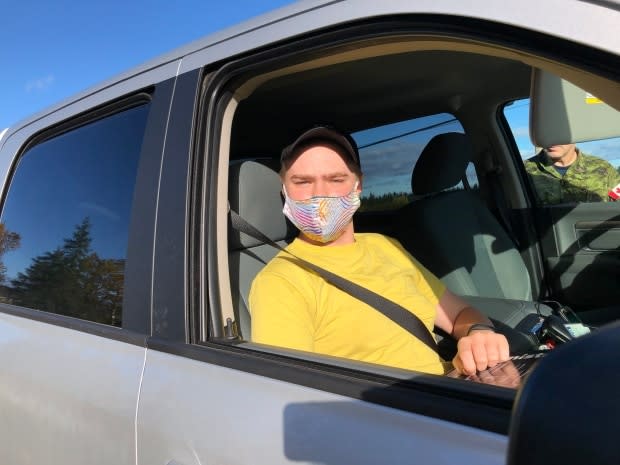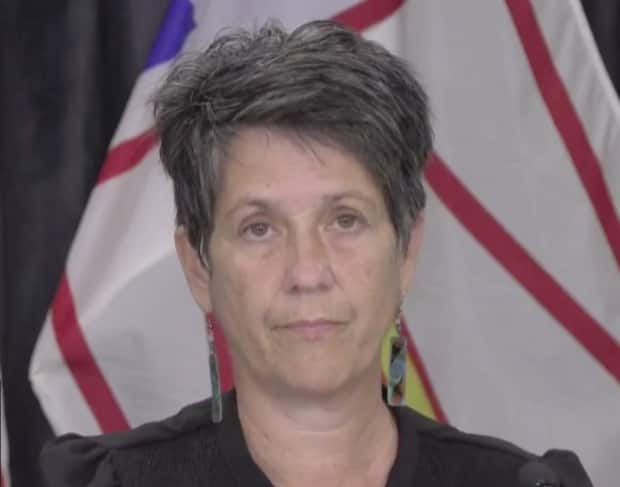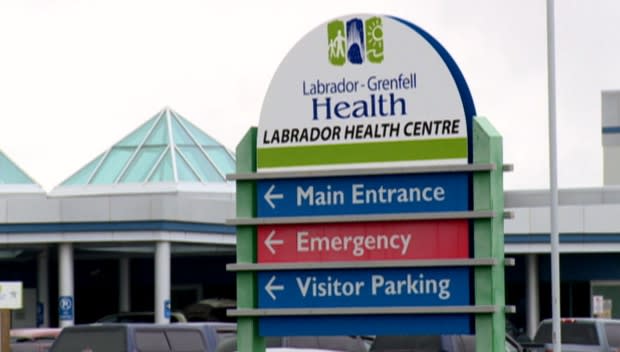Haggie says risk related to Wednesday's COVID-19 case is low, as Labrador test site sees long lineup
The latest case of COVID-19 in Newfoundland and Labrador prompted a hastily called media conference with the health minister, in a bid to answer several questions surrounding a health-care worker who tested positive for the virus.
The woman, who is between the ages of 20 and 39, is not a resident of this province. She is an essential health-care worker, according to the government, who travelled to Labrador from Saskatchewan after receiving a travel exemption.
Health Minister John Haggie reiterated on Thursday what he said the evening before — it is not known if the woman self-isolated in her off-hours of work.
Because of that, the province is asking people who visited Terrington Co-op in Happy Valley-Goose Bay on Sept. 22 between 4:30 and 6:30 p.m. and the Bargain Shop in Happy Valley-Goose Bay on Sept. 23 between 3:30 and 4 p.m. to call 811 to arrange a COVID-19 test.
Anyone who travelled on Air Canada flights 7950 and 7484 departing Regina and Toronto for Deer Lake on Sept. 21, anyone who travelled on PAL flight 901 on Sept. 22, and anyone who stayed at the Holiday Inn Express in Deer Lake on Sept. 21 should also arrange a COVID-19 test.

Haggie said the woman first showed symptoms of the virus after arriving in Happy Valley-Goose Bay, and that it it appears the woman, who has been in the Labrador community for about a week and a half, was not symptomatic during travel to Goose Bay.
He said the risk to the general population is "low or negligible."
Long testing lineups, 'anxiety and concern'
Those recommendations prompted long lineups for testing in Happy Valley-Goose Bay on Thursday. Around mid-morning, there were close to 90 cars along the side of the road near the testing site.
Kyle Curnew, a nursing student, said he could have potentially come into contact with the essential worker and wanted to get tested for his peace of mind.
"I'm not sure if I did or not, but it's in our best interest to get our tests done," he said while waiting in his vehicle. "Better to be safe than sorry."

Phillip Sandall, who works at Terrington Co-op, hasn't been feeling symptoms.
"[The wait is] not too bad," he said. "I'd rather get tested and make sure I don't have it then go to school and spread it to everyone I know and love."
Who should get a test?
Despite the lineup at the testing site, Haggie used Thursday's press conference to try and clarify who needs to be tested and how much of a risk there is when it comes to the virus, while acknowledging there is "significant anxiety and concern."
"I think the reasons for going and getting a test are very clear: either you have been identified by public health as a close contact or you fall into the categories related to Flight PAL 901 or the two stores referenced at the times referenced.
People who don't fall into those categories don't need to get tested, said Haggie, and are potentially displacing people who should.
"If you're in the queue and you happen to live in Happy Valley-Goose Bay [but] you weren't on the flight, you weren't at those stores and you didn't go to the health centre, don't sit in the queue. Go home."

Dr. Rosann Seviour, acting chief medical officer of health while Dr. Janice Fitzgerald takes some time off, said she understands the anxiety
"It's new, it's novel, it's changing," she said. "The risk is low, but out of an abundance of caution, we say if you were in this area, then we would recommend testing, but in acknowledgement of the risk being low, we do not say you need to go home and self-isolate if you don't have symptoms."
Seviour explained that people being asked to self-monitor for symptoms can go about their daily lives.
"You can go to work. Children can go to school," she said. "If then somebody had those symptoms, that would of course change what they did, and we'd encourage them to call 811 for testing."
Use the app, says Haggie
As of Thursday morning, Haggie said, there haven't been any new positive cases found related to Wednesday's new case. He noted, however, that while Happy Valley-Goose Bay has its own equipment, test results are considered presumptive until the tests have been sent to St. John's and confirmed. He said the province's daily caseload would be updated by 3 p.m. NT as usual.

Haggie also said the testing recommendations help provide information for the COVID Alert app, which is now functional in Newfoundland and Labrador.
"It's about completeness of information in this setting. We are not in the situation, fortunately, of places like Ontario or Alberta, and so we have the ability to do this testing and to add value to [the] COVID Alert app. It will only be of value to the general population in a really significant way, however, if we can improve our uptake of that.
About 10 per cent of the Canadian population has downloaded the app, Haggie said, but it needs about 80 per cent for it to be of use.
Health authority compiling possible contacts list
Haggie said Thursday that the woman did work shifts at a health-care facility, but that he doesn't know how many patients or other workers she may have come into contact with.
He said Labrador-Grenfell Health is compiling that list.
Haggie noted essential health-care workers fall into their own category for self-isolation guidelines: they are able to travel to and from their workplace but must self-isolate apart from that.
"But they have to follow a certain protocol — for example, [wearing] a mask all the time. They should not mingle outside of work, breaks and this kind of thing. It is a bit of a different environment, but that is common for all essential workers, and that has to be for the first 14 days after their arrival."
Asked about the possibility of charges being laid against someone who failed to self-isolate, Haggie said the regulations are there for a reason.
"The bottom line is if, in a very simplistic way, there have been significant breaches of the requirements, there will have to be consequences. There's no two ways about it."
Read more from CBC Newfoundland and Labrador


